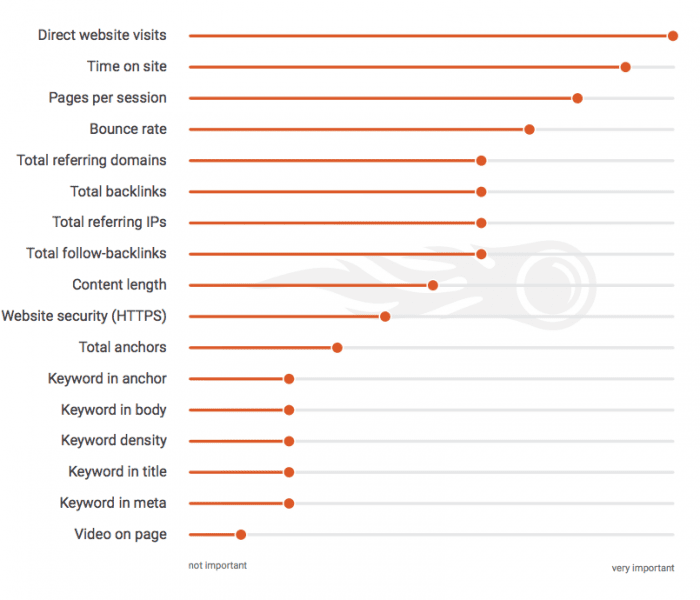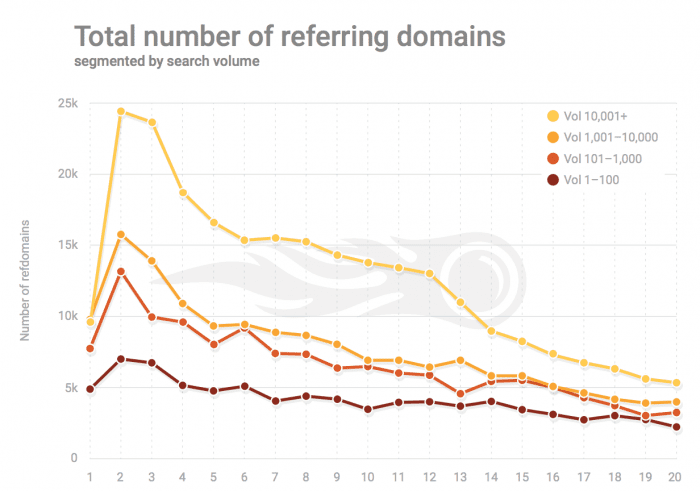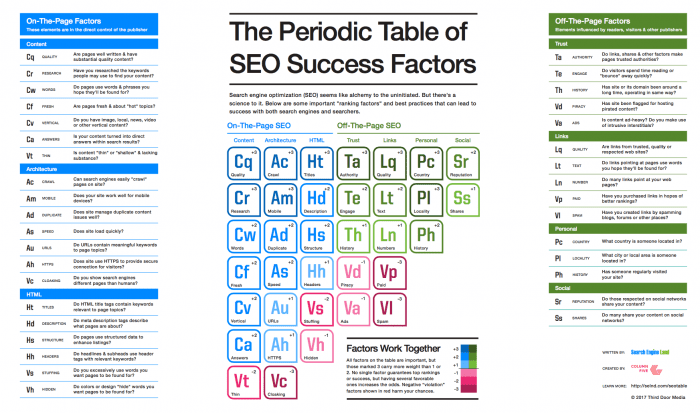Chart of the Day: These are the 17 most important Google ranking factors + the periodic table of SEO success factors
Yes, 'in the world' might have been a bit of an exaggeration, but do you know what is the most important ranking factor for Google right now? It's long been speculated with extensive ranking factors research, but do we SEOers really know? It's vital to note that this research is based on correlation and not causation and that all aspects of on-page and technical SEO need to done to improve chances of ranking on SERPs.
Direct visits and engagement metrics
According to SEMRush's research 'Ranking Factors 2.0' direct website visits are the most important ranking factor.

Time on site, pages per session and bounce rate are also highly rated as important. Taking these into consideration, it is not surprising these are the most important ranking factors as they all indicate a higher quality of content users receive. Higher time on site and lower bounce rates should associate itself with users spending more time on your site and engaging with your content. Thus, the longer they spend on your page and site, the more Google's algorithm realizes the content is engaging and prioritizes this in SERPs against competitors targeting the same keyword with less engagement.

However, direct website visits are likely to be higher for larger, better-known companies and brands. This is because of URL type-ins or Googles autosuggested addresses. For instance, if you directly type 'f' into your browser search you'll often then not get the suggested search for a previously searched for term i.e. Facebook - by clicking on this it takes you directly to Facebook rather than SERPs for Facebook where you need to click through again to get to their site. Gaining direct visits is much harder for smaller brands as users need to type out the full URL address to go directly to site. This is why you'll find some companies now brand themselves .com or .co.uk etc. as a way for users to go directly to their website.
By making sure your URL is short and memorable users are more likely to remember it when searching. Take for instance these examples: AO.com, Hotels.com. They have been branded with .com on the end to encourage direct visits and to increase their online identity.
What is interesting is the importance placed on total backlinks. Google's quality guidelines on link schemes prohibit any links that are intended to manipulate PageRank, which is why it surprises me that 'link equity' or juice as Moz calls it is placed rather high in this research whether it is unique domains or total backlinks.
Google's webmaster requirements state that:
The following are examples of link schemes which can negatively impact a site's ranking in search results:
Buying or selling links that pass PageRank. This includes exchanging money for links, or posts that contain links; exchanging goods or services for links; or sending someone a “free” product in exchange for them writing about it and including a link
Excessive link exchanges ("Link to me and I'll link to you") or partner pages exclusively for the sake of cross-linking
Large-scale article marketing or guest posting campaigns with keyword-rich anchor text links
Using automated programs or services to create links to your site
But, that is not to say that links cannot be gained organically as often sites will cite each other if a piece of content is worth sharing or a piece of research is being discussed.
SEMRush also found that there is a 45% difference in content length between the top-3 and 20th position on Google, with a 49% bounce rate for domains ranking within Top-3.
Keyword importance
The importance of keywords in content is much lower than Google's engagement metrics.
Why?
Because adding keywords to the text, title, meta etc. is easy business and we find too often that too many companies are still 'keyword stuffing' to manipulate PageRank. Adding keywords to the copy of content does not necessarily mean, anymore, quality of content. There is a huge importance of content quality that users consumer online so providing quality content that answers their questions or search query must be prioritized over adding in your keywords in 5% of your copy.
Having ranking factors based on time on page, bounce rate and direct visits is a better indicator of the quality of content.
Also, the chart below shows the trend in the number of referring domains against the ranking position in SERPs. The higher the domain’s position on the SERP, the more referring domains it has. This tendency is consistent for all search volume groups.

Please note that it is speculated that there are approximately 200 Google ranking factors (known, controversial and speculative), with some more important than others. Some SEO experts swear by it whilst others call it a myth. Search Engine Land published their Periodic Table of SEO factors, which explains the off and on-page factors that work together plus negative violation factors that harm SEO.











